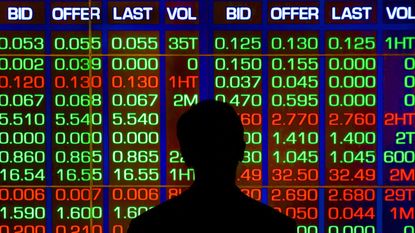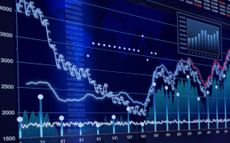Stock Market Today: Stocks Waver as Government Shutdown Looms
Rising yields, higher oil prices and Washington's march toward its first shutdown since 2019 sapped risk appetite.


Stocks rebounded to close mixed Tuesday but not before market participants spent the majority of the session continuing to fret about higher for longer interest rates, rising bond yields, a spike in prices for crude oil and the reality that the federal government is hurtling toward its first shutdown since 2019.
A stronger-than-expected reading on U.S. manufacturing activity did offer an economic bright spot on Tuesday. Orders for long-lasting U.S. manufactured goods easily topped economists' estimates for August. The resilience in orders for durable goods was driven by "strong business investment spending and robust defense expenditures," writes José Torres, senior economist at Interactive Brokers.
Markets spent almost the entire session preoccupied with more downbeat developments, however. In addition to mounting anxiety about rising Treasury yields and a resurgent U.S. dollar, Torres noted that the autoworkers strike is taking an increasing toll on market sentiment.

Sign up for Kiplinger’s Free E-Newsletters
Profit and prosper with the best of expert advice on investing, taxes, retirement, personal finance and more - straight to your e-mail.
Profit and prosper with the best of expert advice - straight to your e-mail.
"The ongoing UAW strike against the Big Three automakers is also adding to investor anxiety about wage pressures, inflation, and the health of supply chains," Torres notes.
Meanwhile, oil prices continued their ascent Tuesday, adding to worries about inflation but making winners out of select energy names. U.S. benchmark West Texas Intermediate crude oil futures rose 3.6%. Among the day's biggest gainers were Occidental Petroleum (OXY), ConocoPhillips (COP) and Exxon Mobil (XOM).
At the closing bell, the blue chip Dow Jones Industrial Average slipped 0.2% to 33,550, while the broader S&P 500 was essentially unchanged at 4,274. The tech-heavy Nasdaq Composite added 0.2% to finish at 13,092.
Shutdowns aren't necessarily bad for stocks
The federal government is fast approaching the October 1 deadline when it will begin shutting down. This is not good economic news, at least not in the shorter term.
"A shutdown, if it happens, would ding GDP growth in the fourth quarter, to the tune of 0.2% of GDP for every week it lasts, as nonessential federal agencies halt work and their employees go unpaid," writes David Payne, Kiplinger staff economist. "However, whenever the shutdown ends, federal workers are likely to get back pay, which would boost growth in early 2024."
Either way, historically it turns out that government shutdowns haven't been particularly bearish for stocks. During the 21 government shutdowns since 1976, the S&P 500 rose 55% of the time, generating an average return of 0.3%, according to data from Carson Group. Even better, 12 months after the end of the shutdown, the S&P 500 was higher 86% of the time, with an average return of 12.7%.
It's tough to remember now, but the S&P 500 returned 10.3% during the 35-day shutdown of 2018-2019. Stocks did fine during the extended shutdown of October 2013 too.
Related content

Dan Burrows is Kiplinger's senior investing writer, having joined the august publication full time in 2016.
A long-time financial journalist, Dan is a veteran of SmartMoney, MarketWatch, CBS MoneyWatch, InvestorPlace and DailyFinance. He has written for The Wall Street Journal, Bloomberg, Consumer Reports, Senior Executive and Boston magazine, and his stories have appeared in the New York Daily News, the San Jose Mercury News and Investor's Business Daily, among other publications. As a senior writer at AOL's DailyFinance, Dan reported market news from the floor of the New York Stock Exchange and hosted a weekly video segment on equities.
Once upon a time – before his days as a financial reporter and assistant financial editor at legendary fashion trade paper Women's Wear Daily – Dan worked for Spy magazine, scribbled away at Time Inc. and contributed to Maxim magazine back when lad mags were a thing. He's also written for Esquire magazine's Dubious Achievements Awards.
In his current role at Kiplinger, Dan writes about equities, fixed income, currencies, commodities, funds, macroeconomics, demographics, real estate, cost of living indexes and more.
Dan holds a bachelor's degree from Oberlin College and a master's degree from Columbia University.
Disclosure: Dan does not trade stocks or other securities. Rather, he dollar-cost averages into cheap funds and index funds and holds them forever in tax-advantaged accounts.
-
-
 Food Costs Are Up — Along With Promotions
Food Costs Are Up — Along With PromotionsWith food costs still high, you’re being more choosy about where to shop and dine. Supermarkets and restaurants are getting the message.
By Jamie Feldman Published
-
 Giving to Charity This Holiday Season? Eight Tips for Doing It the Right Way
Giving to Charity This Holiday Season? Eight Tips for Doing It the Right WayMaximize your efforts by following these expert-recommended tips.
By Kiplinger Advisor Collective Published
-
 Stock Market Today: Stocks Extend Monthly Losing Streak
Stock Market Today: Stocks Extend Monthly Losing StreakThe main indexes ended Tuesday with modest gains but finished October in the red.
By Karee Venema Published
-
 Stock Market Today: Dow Soars 511 Points After McDonald's Earnings
Stock Market Today: Dow Soars 511 Points After McDonald's EarningsAll three indexes notched impressive gains Monday ahead of a jam-packed week on Wall Street.
By Karee Venema Published
-
 If You'd Put $1,000 Into Disney Stock 20 Years Ago, Here's What You'd Have Today
If You'd Put $1,000 Into Disney Stock 20 Years Ago, Here's What You'd Have TodayDisney Disney stock, a long-time market laggard, has shed more than $220 billion in value since its all-time high.
By Dan Burrows Published
-
 Stock Market Today: S&P 500 Joins Nasdaq in Correction Territory
Stock Market Today: S&P 500 Joins Nasdaq in Correction TerritoryThe Nasdaq managed to hold higher into the close thanks to a strong earnings reaction for mega-cap stock Amazon.
By Karee Venema Published
-
 Stock Market Today: Stocks Fall Again After Sizzling GDP Report, Meta Earnings
Stock Market Today: Stocks Fall Again After Sizzling GDP Report, Meta EarningsThe first look at third-quarter GDP came in higher than expected, with consumer spending helping to prop up the economy.
By Karee Venema Published
-
 Stock Market Today: Nasdaq Enters Correction Territory After Alphabet Earnings
Stock Market Today: Nasdaq Enters Correction Territory After Alphabet EarningsSolid results from Microsoft weren't enough to offset substantial post-earnings losses from fellow mega-cap stock Alphabet.
By Karee Venema Published
-
 Stock Market Today: Earnings Boost Stocks, Bitcoin Price Hits New High
Stock Market Today: Earnings Boost Stocks, Bitcoin Price Hits New HighBitcoin rallied to its highest level since May 2022 amid signs that a spot bitcoin ETF could hit the market sooner rather than later.
By Karee Venema Published
-
 Stock Market Today: Stocks Finish Mixed as Treasury Yields Stabilize
Stock Market Today: Stocks Finish Mixed as Treasury Yields StabilizeStocks started the day in the red as the 10-year Treasury yield topped 5%, but finished well off their session lows.
By Karee Venema Published









